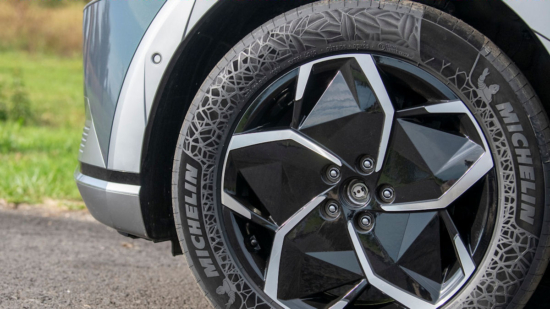Michelin exceeds 2030 sustainability targets with latest tyre prototypes
 The road-approved car tyres contain 45% sustainable materials; the bus tyres 58% (Photo: Michelin)
The road-approved car tyres contain 45% sustainable materials; the bus tyres 58% (Photo: Michelin)
Two new Michelin tyres take the manufacturer a step closer towards its goal of global production with 100 per cent bio-sourced, renewable or recycled materials by the middle of the century. Approved for road use, the non-production car and bus tyres respectively contain 45 and 58 per cent sustainable materials. Michelin says the tyres have “performance levels strictly identical to current tyres” and prefigure the technologies we’ll see in its products within two to three years.
Both tyres exceed the intermediate goal Michelin has set for 2030 of 40 per cent bio-sourced, renewable or recycled materials in its global production. The tyre maker attributes this progress to a greater use of natural rubber, together with the inclusion in its tyres of recycled carbon black, oils such as sunflower oil and bio-sourced resins, silica from rice husks and even recycled steel. It claims utilising these materials without compromising performance in any way, and took care not to impact the environment at each stage of the lifecycle: design, manufacture, transport, use and recycling.
Patents & partnerships
Some 6,000 engineers, researchers, chemists and developers are helping Michelin on its journey to 100 per cent in 2050. As of last year, the company held 3,678 active patents for high-technology materials.
Aware that the pace and nature of innovations in the field of sustainable materials require new skills, Michelin has engaged in a programme of targeted partnerships, allowing it to accelerate the development of breakthrough technologies, in particular in the fields of transformation and recycling. Examples of this are Pyrowave (r-styrene), Carbios (r-PET), Enviro (rCB), IFPEN/Axens with the participation of the ADEME (French agency for ecological transition) (bio-butadiene), the Empreinte project undertaken with the ADEME, and the setting up of circular economy projects BlackCycle and Whitecycle, which Michelin is running with numerous European partners and with the backing of the EU, to transform end-of-life tyres into high quality raw materials that can be incorporated in new tyres.




Comments